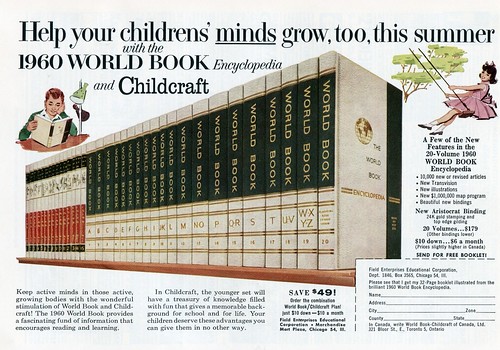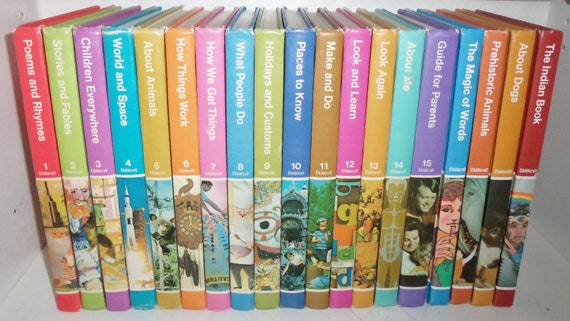G
Guestx
Guest
(Note: What follows ended up being a bigger production than I originally intended. It's a product of nostalgia and, I guess, a desire to inform about an interesting bit of history. I'd be interested in hearing any of your own thoughts or memories on the subject.)
So last night I was just chilling and, I'm not sure why, but a question hit me: Are there any English encyclopedias still being printed? That is, can you still order an actual set of encyclopedias to sit on your bookshelf?
And that got me to thinking about encyclopedias in general. And it got me to reminiscing about the old days, when I was a kid and would pull down random volumes of my family's World Book set and flip through them. One thing that came back to me was when I was about seven years old and I read an article about airplanes, and I started making plans to build a plane out of wood that was stacked up in the backyard.

So I went down a minor rabbit hole, reading about encyclopedias. I found out that, in the US at least, there were three major ones, sometimes referred to as the ABCs: the Encyclopedia Americana, the Encyclopedia Britannica, and Colliers Encyclopedia. In addition, there was also the previously mentioned World Book, as well as a fifth option, Funk and Wagnalls.
Collier's described their encyclopedia thusly: "A scholarly, systematic, continuously revised summary of the knowledge that is most significant to mankind." And that stood out to me, this idea that we have these self-contained general knowledge sets meant to give anyone a solid overview of nearly any topic.
But it surprised me that Americana and Colliers were considered among the top three, because I had never heard of them. I had, of course, heard of Britannica though, as I'm sure we all have.

But I also remembered the fifth, and perhaps most humble of those mentioned, Funk and Wagnalls, and I want to talk about that for a minute. Funk and Wagnalls was unique in that, instead of dropping $1,000+ at one time for a full set, they marketed their encyclopedia through supermarkets. Volumes would be released individually and ads encouraged people to put the next volume on their shopping list. Once all volumes had been purchased you'd have a complete set!
I remember this because one of my local grocery stores carried Funk and Wagnalls in the mid-90s. I think I ended up collecting all of about two volumes. I guess I didn't get very far.

Of course as time went on people began to turn toward computers for information, and digital encyclopedias began hitting the market. A couple of early ones included Compton's Multimedia Encyclopedia (1989) and the New Grolier Multimedia Encyclopedia (1992). But I'm sure the one that most people here remember is Microsoft Encarta, which first arrived in 1993.

The benefit of these multimedia encyclopedias is one that I think still exists today, and that is specifically the ability to embed sound and video to supplement the text. But nevertheless, Encarta didn't last and ended its run in 2009.
While to my knowledge Microsoft has never stated it, the reason for this is widely speculated to be the rise of Wikipedia. Not much needs to be said about this. We all know what Wikipedia is and I'd make the guess that these days it's the ONLY encyclopedia that anyone here uses. (If I'm wrong, I'd like to hear about it.)

But let's bring this discussion full circle. . .
It began with a question: Are there any major English encyclopedias still available in a print edition?
Well, Funk and Wagnalls stop printing theirs in 1997, with Colliers following their lead the next year. The Americana made it all the way to 2006, with the company ending their print run despite claiming that sales were still good.
So that leaves two: Britannica and World Book.
In 2012, Britannica called it quits (in printed form at least, they still have digital offerings). The final printing sold out quickly, with the set going for $1600.

And then there was one. A final man standing, and curiously enough, also the same encyclopedia that I started with: World Book.
That's right. There is still ONE MAJOR ENCYCLOPEDIA that you can purchase in print form and put on your bookshelf for everyone to see. For $999, they will be happy to send you the 22-volume 2016 edition of the World Book Encyclopedia.
The only question now is how much longer will that last?
So last night I was just chilling and, I'm not sure why, but a question hit me: Are there any English encyclopedias still being printed? That is, can you still order an actual set of encyclopedias to sit on your bookshelf?
And that got me to thinking about encyclopedias in general. And it got me to reminiscing about the old days, when I was a kid and would pull down random volumes of my family's World Book set and flip through them. One thing that came back to me was when I was about seven years old and I read an article about airplanes, and I started making plans to build a plane out of wood that was stacked up in the backyard.

Collier's described their encyclopedia thusly: "A scholarly, systematic, continuously revised summary of the knowledge that is most significant to mankind." And that stood out to me, this idea that we have these self-contained general knowledge sets meant to give anyone a solid overview of nearly any topic.
But it surprised me that Americana and Colliers were considered among the top three, because I had never heard of them. I had, of course, heard of Britannica though, as I'm sure we all have.

I remember this because one of my local grocery stores carried Funk and Wagnalls in the mid-90s. I think I ended up collecting all of about two volumes. I guess I didn't get very far.


While to my knowledge Microsoft has never stated it, the reason for this is widely speculated to be the rise of Wikipedia. Not much needs to be said about this. We all know what Wikipedia is and I'd make the guess that these days it's the ONLY encyclopedia that anyone here uses. (If I'm wrong, I'd like to hear about it.)

But let's bring this discussion full circle. . .
Well, Funk and Wagnalls stop printing theirs in 1997, with Colliers following their lead the next year. The Americana made it all the way to 2006, with the company ending their print run despite claiming that sales were still good.
So that leaves two: Britannica and World Book.
In 2012, Britannica called it quits (in printed form at least, they still have digital offerings). The final printing sold out quickly, with the set going for $1600.

That's right. There is still ONE MAJOR ENCYCLOPEDIA that you can purchase in print form and put on your bookshelf for everyone to see. For $999, they will be happy to send you the 22-volume 2016 edition of the World Book Encyclopedia.
The only question now is how much longer will that last?
Last edited by a moderator:



